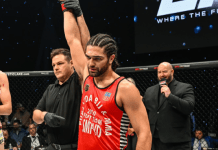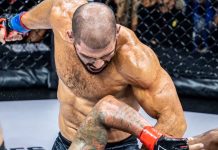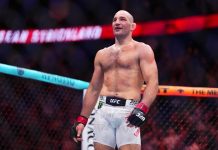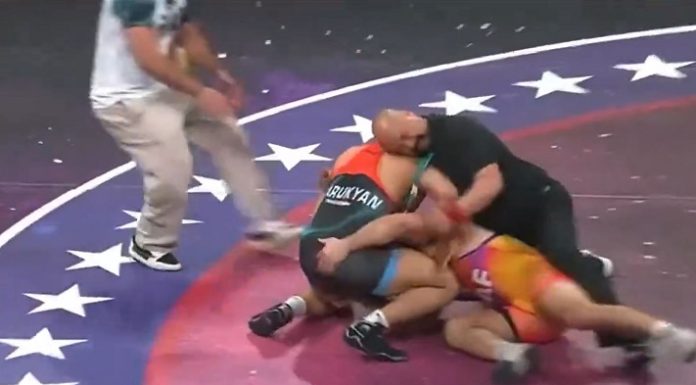
Something is set to happen this weekend that hasn’t happened in more than a decade: competing at RIZIN 44 against Japanese heavyweight Tsuyoshi Sudario, Todd Duffee is fighting twice in a calendar year.
After years of struggles with injury and a falling out with the UFC (who later signed him to a second stint), Duffee finally has a chance to get active. He returns to the cage, or in this case the ring, looking to bounce back from a loss in his rematch with Phil De Fries under the KSW banner earlier this year.
Originally, Duffee was lined up for a fight with Adam Koresh in fledgling promotion Israel Fight Night, only for things to fall through. “I had a verbal agreement to fight Koresh, but I didn’t get the contract in time. And I didn’t want to put off RIZIN,” Duffee (9-4, 1NC) told Cageside Press in a recent interview. “It’s just one of those things. I don’t know why they announced it prior to a contract, I didn’t view the contract.”
With the RIZIN offer on the table, the choice was clear. And while he admits it’s nice to be fighting twice in a year, after dealing with Parsonage–Turner syndrome, knee and shoulder injuries, and even COVID over the years, Duffee also added that “it’s a serious hassle to pull it off, I’ll be honest. I’m knee deep in visa paperwork now as we speak.”
Duffee’s struggles with health have been well-documented over the years. What has perhaps been less well-documented are his thoughts on managers in the sport, and his struggles to fight while going it alone in terms of management in more recent times. “Promoters don’t necessarily want what fans want. That’s what I would say. It’s a dirty game in that aspect especially. There’s a bad MMA manager mafia that kind of controls the majority of these promotions, and if you’re not in one of those, you’re not getting in a lot of times. It’s not for lack of trying.”
Duffee, who still hopes to fight again for KSW at some point, noted that “I think I’ve been very lucky to get this opportunity with RIZIN. I would have liked to fight for KSW sooner, it just didn’t work out with timing and I was desperate to find a fight. I heard that they were looking for somebody for this guy, and I signed up for it.”
To help the process, Duffee did sign up with a new manager a few months back (in the past, he’s been managed by Alex Davis, and later Dominance MMA); prior to that, even RIZIN didn’t appear ready to engage him. It’s “just a part of the business that people want to ignore, pretend like it doesn’t exist,” Duffee later stated, questioning what purpose managers really serve in mixed martial arts.
“I don’t think managers are really necessary in the sport past the promoters using managers to manipulate. I don’t know what managers do past make friends with the promoters and massage their guys in. I’m really lacking to understand what that is in MMA. And the reality is, if you don’t have a manager, a lot of times the promotions won’t even talk to you. They’ll dismiss you, and I don’t have an answer as to why that is. Have some ideas; every promotion’s different.”
Todd Duffee is not alone with this criticism. Dominick Cruz has opted to manage himself, while fellow bantamweight (and current UFC champ) Sean O’Malley has repeatedly criticized the role of managers in MMA. Combat Sports Law’s Erik Magraken took a look at MMA management contracts back in 2020, more recently, he suggested that to get to the UFC, fighters needed to sign a deal with “cozy” managers, before signing their deal with the promotion itself.
Sean O'Malley cautions young fighters to be “skeptical” of MMA managers, especially if they're "really close to the UFC" ⚠️ #UFC292
“There’s high-level scumbags out there and they’re good at being scumbags.” pic.twitter.com/J34HtJSwd1
— MMA Fighting (@MMAFighting) August 16, 2023
One factor that could throw the entire management industry in MMA for a loop is the ongoing antitrust lawsuit against the UFC, which was recently given class certification. A judge also ruled that records in the case were to be unsealed — including fighter contracts. Duffee noted that there are some positives emerging from that action.
“I think the one thing that’s going good on the current situation is, it’s in October [when court records will be unsealed]. So it looks like a judgment may happen quickly, and it sounds like the judge is very— he left kind of a scathing rebuke, I guess you could say almost. He used strong words.”
Duffee added, however, that “we don’t know how much of that is a political move, and how much is him actually, he means what he says, like ‘oh sh*t we’ve got a problem here, I’m going to do something about it.'”
While Duffee is one of the fighters covered by the class action lawsuit, he’s not one of the fighters directly involved. “I don’t have high expectations. I don’t imagine that will work out much cleaner. At best, they’re going to pull in a billion, those lawyers are going to take over half, and then maybe they’ll set up some medical fund for guys, I think that’s the most you could hope for from it. And then I guess maybe you could hope that contracts change, and managers, and things like that.”
What Duffee sees, however, is a problem of not just scale, or empathy, but turnover among the fanbase. The media, he noted, has to constantly re-educate the next generation of fans.
“I think casual fans and the fanbase in general is a three to five year shelf life. You guys have to constantly re-educate. The people who cared about this back in 2012 are probably not even fans of the sport right now,” suggested Duffee. “At least from my perspective, I’ve seen that quite a lot.”
He also questions whether the ongoing lawsuit is digging deep enough. “You’re talking to somebody who was cut for their ‘attitude problem,'” said Duffee, regarding the end to his first UFC run. Keep in mind, UFC fighters are independent contractors, supposedly, not employees. “They [those behind the lawsuit] didn’t want to know about my situation. So I don’t know how dirty and gnarly they’re going to really get. I think it’ll probably be less shocking than is being advertised. But we’ll see I guess.”
There are solutions, believes Duffee, to the fighter pay issue. “Use your fighters as an ambassador, give them a salary, 50K a year that way they’re not destitute. That alone might alleviate a lot of this bullsh*t.” As for the lawsuit, while some good may come of it, Duffee also expects some growing pains.
“It may be a very drastic impact and there may be a very big money cut initially with some of these new things that pass, and I don’t think people are realizing that. People may stand to make less money when this all comes through, at least in the initial phases.”
Which brings us to what fighting is, and is not, in terms of a profession. For many, it’s not a full time job. “People think it’s so cool that I fight professionally, until they actually find out what that entails,” Duffee told us. “And then they’re like ‘oh that’s stupid, why do you do that?’ It’s a lot of propaganda.”
“There’s just a lot of propaganda to be a fan of MMA,” he added. Asked how one gets by in a situation like his, having to take years off from fighting for a living, Duffee replied by saying “that’s the big joke. No fighter fights for a living. It’s a lie. It’s a myth. It’s more propaganda. Very few and far between are actually doing this for a living. I have another job, I work as a personal trainer. I own stuff.”
That’s no surprise. Many other fighters teach classes, or run their own gym.
“It’s a hobby, bro. Fighting is a professional hobby. And it’s a shame. To do it at the level that you have to do it at, it becomes a very gnarly scenario essentially. My god, look at the hours you have to put in, look at the time you have to put in, and look what that takes away. And then, what are you getting back?”
“That’s how it’s been set up forever,” Duffee continued. “It’s about the platform fighting gets you. That’s why you can fight for show and win money, because you’re getting a platform.”
Show and win money was another topic that prompted Duffee, now one of the veterans of the heavyweight division, to laugh. He questioned the reasoning behind the concept. “You’re worried about a guy not going out and fighting and protecting his physical health, that’s your excuse? You think he’s going to go a little less because there’s not any incentive financially?”
With promotions maintaining that health is not enough of an incentive, “fans and people really believe ‘oh that’s how you motivate him to fight,'” said Duffee. “Yeah, that’s how you do it? That’s what’s motivating him? It’s not the fact that they’re locked in a cage with someone that will physically harm them if they don’t fight?”
Of course, Duffee has his own fight coming up on September 24 at RIZIN 44. At the Saitama Super Arena, he’ll face former sumo wrestler Tsuyoshi Sudario. Duffee was quick to point out the misconceptions fight fans may have about his opponent.
“I think when people here sumo, they hear Akebono, and even Akebono would fight. That’s not what this guy is. This guy is a guy who has been a professional athlete probably his whole life as a sumo wrestler, but he’s young enough and he has started MMA early enough that he has just been given some of the sumo attributes. He probably has a good understanding of discipline, that’s why he’s been able to acquire skills at a very fast rate from my judgment of watching his fights.”
He sees his opponent more along the lines of a college football player making the transition to MMA. “He’s young, he’s highly athletic. When people think of sumo wrestlers, they don’t think of athleticism, honestly they should because they’re very good in those first two steps. They’re also going to have very quick hands.”
The different rule set is another factor in the fight, one Duffee believes is bigger than it seems.
“It’s a completely different sport. When you take away the cage, it’s a different sport. When you add the additional leg strikes on the ground to a grounded opponent, that is also a different sport,” opined Duffee. “The dynamic is completely different. It’s different every which way. You go from cage wrestling to over/under Greco open-mat, freestyle wrestling. Those are two different sports. Cage wrestling is its own thing.”
Truth be told, the 15+ year veteran of the sport actually sounds excited about all of it. “It’s different dynamics. The cage plays to the bigger power athletes typically, especially with heavyweights. This format kind of plays to the martial artist a little better. It’s definitely exciting, it’s a new challenge, it’s definitely stimulating from the mental side,” Duffee admitted. “That’s been the really interesting part of the camp — I’m opening up tools that I haven’t opened up since I was 24 or 22, back when we were still trying to figure out how this sport worked.”
Todd Duffee faces Tsuyoshi Sudario at RIZIN 44 on September 24, 2023 at the Saitama Super Arena in Saitama, Japan.





















